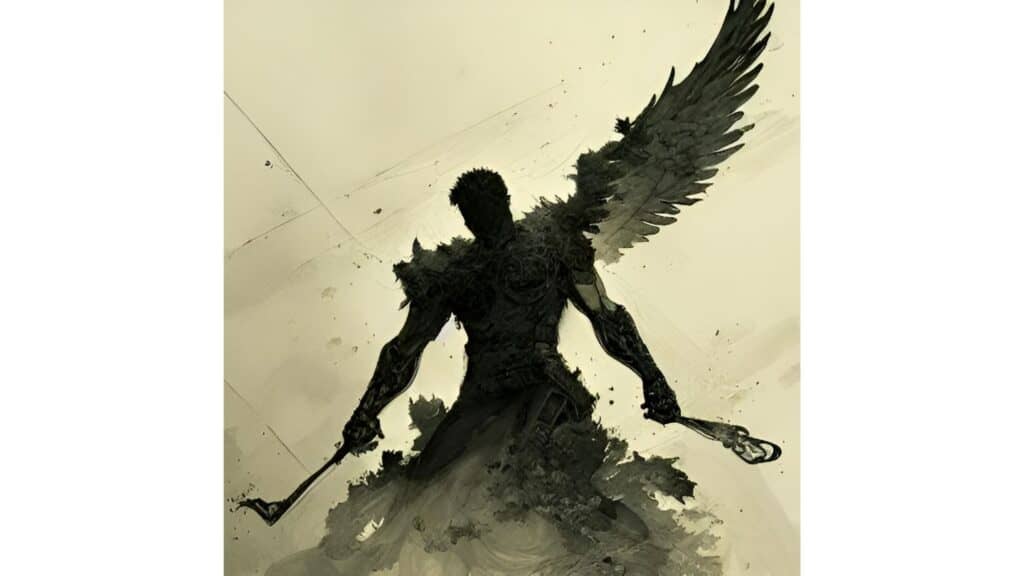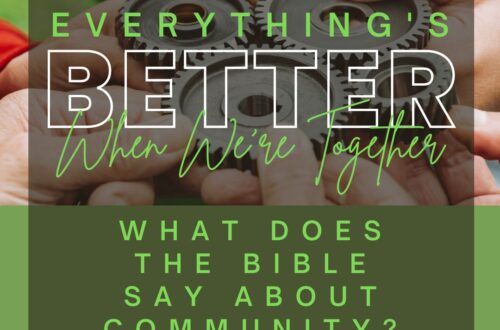What is Christianity?
by Michael Colon
Growing up, I would hear about God, but I never followed or practiced any form of religion. For most of my childhood, God remained a very vague concept, a higher power that resembled more of a fictional unknown than the loving Father He is. For most of my upbringing, I never had a personal relationship with The Father. I would hear the word “Christian” from my mother and get a basic understanding of what it was all about, but nothing life-changing took place. After years of holding in my traumas while fighting my inner battles on my own, I began to crack, feeling lost in this life. Life became less like a blessing and more like a burden.
I would look at my reflection in the mirror and not fully know who I was staring at. Just who is Michael? That line of thinking made me feel empty. The feeling of having no purpose followed me for a very long time until I finally gave myself to Jesus Christ. When saying yes to Jesus, going to church, reading the word, and following the fundamental beliefs of Christianity, I started to become more spiritually sensitive to what I needed healing in. Through faith, life became more transparent and brighter while having my soul saved simultaneously.
Contents
Definition Of Christianity
What is the definition of Christianity? The textbook definition talks about a religion people abide by based on laws and hierarchy within an institutionalized regulatory facet. However, I believe the true spiritual meaning of how God would define Christianity is being a faithful disciple of His Son, Jesus Christ.
Most religions are based on earning blessings through an ideological concept of working through rules to reach paradise. However, being a Christian means having a relationship with Jesus, the Son of God, following His teachings with all our heart, thereby growing towards complete sanctification.
When Christians are living and acting out their salvation, they show the world the definition of the word "Christian." Share on XThe definition of Christianity is not trying to be God or a perfect human being. It’s about acknowledging our sinful faults, repenting, and showing the power of faith in His will so we can be better as God’s children. Some churches will give a slightly different explanation of Christianity based on their principles. Still, regardless of denomination, the Christian faith is all about getting to know Jesus Christ more intimately so we can live the fruitful lives that were always intended for us.
{Related – “Following Jesus – Be Worthy of Being His“}
The History Of Christianity
Christianity was founded during the first century in the Roman Empire in Judea, modern-day Jerusalem. The faith is about two thousand years old and was founded by Jesus of Nazareth. While Jesus was alive, He performed miracles and taught as many people as he could until the Romans crucified Him. After the death and resurrection of Jesus Christ, the Apostolic Age came to be beginning with the Day Of Pentecost.
The Day of Pentecost is when the Holy Spirit empowered the original disciples during a gathering of worship and feasting, which is considered the first congregational gathering. The disciples and other believers saw the power of Holy Spirit in their house of worship. From that point, the apostles could speak various languages and do wondrous things to spread the good news. This day signaled the beginning of the Church Age.
The apostles went on many missions as instructed by Jesus Christ Himself. By 350 A.D., over half of the Roman Empire had converted to Christianity. Eventually, in 425 A.D., Rome’s downfall from political implosions of military and political issues allowed the Christian faith to be taught more freely and effectively.
Gradually, through the Middle Ages, several inquisitions, the Reformation, and the Great Awakenings, Christianity changed the Western world spiritually, as the message of Jesus found its way to all nations through trials and tribulations.
Christian Religions
There are many religions that claim to be Christian, but their beliefs are as diverse as the members they are made up of. Some religions that claim to be Christian share the same core beliefs spoken of in the Bible, while some diverge from these beliefs and go in different directions. Here are a few major denominations of Christianity.
Catholicism, derived from Roman Catholicism, has a priest who acts as a moderator between church members and God. Catholics attend Sunday mass and are more regimented to a uniform style of worship. Catholic cathedrals are impressive in architecture, with large stained glass windows and statues of the saints. They pray to the saints and the Virgin Mary, not just God. A significant rule for priests is that they are celibate during their time of serving. The head of all Catholic churches is called the Pope.

Lutheranism stems from the works of Martin Luther, one of the most important Christian figures of all time. Lutheran churches are heavily focused on the sacraments (bread and wine representing the body and blood of Jesus) and proclaiming the word of God. Lutheran churches follow three major creeds: the Nicene Creed, the Apostles’ Creed, and the Athanasian Creed. Lutheranism was the first main branch of the faith to separate themselves from Catholicism.
The Protestant branch of the faith was created by people like Martin Luther, John Calvin, and other Christian figures who opposed the Catholic church for what they believed was a tainted system of faith and spiritual teachings. The protestant denomination came to be during the Reformation in the 16th century AD. They believe justification for sin is built off faith and follow the five “solas,” a Latin word for “alone.” Sola Fide, which is by faith alone; Sola Scriptura, which is by scripture alone; Solus Christus, which is by Christ alone; Sola Gratia, which is by grace alone; and Soli Deo Gloria, which is glory to God alone.
Baptist churches began popping up in the 1600s. Baptists believe Christ is the head of the church rather than the pastor. Their services include a variety of worship and singing. New believers can choose to get baptized at the end of a service.
Methodists in the seventeen hundreds had a massive impact on colonial America. John Wesley, the founder, sought to reform the Church of England from within their original faith-based ways. They focus on developing relationships with other believers regardless of spiritual levels of maturity, giving grace, and righteous Christian living.

The most recent twentieth-century movement within the Church is that of nondenominational churches, also called independent churches. They don’t align themselves to a specific denomination; rather they combine beliefs and practices from many different denominations based on what leaders believe is best for their congregations.
Basic Christian Beliefs
The major Christian beliefs are founded on Jesus’ Christ’s teachings and resurrection. Some basic beliefs of Christianity (doctrine) are that:
- Jesus Christ is the Son of God.
- God created the world and everything in it but was separated from man until the sacrifice of Jesus on the cross.
- humans are created in the image of God and have both a spiritual and physical dimension.
- Jesus died for our sins, granting salvation that acts as a bridge to connect us, sinful humans, to God.
- the Bible is the living word of God and is all Christians need to live a righteous life in Christ Jesus.
- the Father (God), Son (Jesus Christ), and Holy Spirit are 3 in 1, making up the Trinity.
- there is a spiritual battle between good (angels) and evil (Satan and demons) going on that we cannot see (spiritual warfare).
- there is a heaven and there is a hell; all people will spend eternity in one of these places.
- the Church is a collection of Christians from all over the globe who are meant to spread the good news of salvation and carry out God’s plan for humanity on earth.
- at the end of time, Jesus will return. Nobody knows when this will occur.
Salvation
What the Bible tells us about salvation is that it’s a gift. Salvation shows God’s love for us on a scale we can’t comprehend because of how much we have fallen. We can’t work for salvation on our own accord. Salvation is only possible because of Jesus’s sacrifice. Our spirits were held hostage by the evil one to be forever condemned to hell. The blood of the spotless lamb washes believers clean. Salvation allows us to be the salt and light of the world for others still in the Devil’s shackles. When we say, “Yes,” to Jesus Christ and invite Him into our lives, we are saved in the eyes of the Father.
{Related – How to Get Saved (Spoiler: It’s so Simple!)}
The Holy Spirit
The Holy Spirit is part of the Trinity that makes up what God is. When John baptized Jesus, the heavens opened up, and The Holy Spirit descended on Jesus in the form of a dove. The Holy Spirit, the Great Paraclete, God’s helper, is a guide of light and counselor for those with faith. The Holy Spirit was first mentioned in Genesis as He hovered over the waters of the formless earth. The Holy Spirit’s powers change the hearts of people allowing them to receive the gift of salvation offered by God through His Son, Jesus. The Holy Spirit is responsible for the activity we see from the Lord through His people.
Spiritual Warfare
Angels and demons are also part of our story as created beings by God. Angels are a separate order of creation, meaning the way God made man is different from the way He made angels. Angels don’t exist the same way we do to how we perceive reality with our human senses and capabilities. To start with, angels are not made of flesh and bone like we are; they are spirits. Angels are spirits, but they aren’t omnipresent, and God tells us not to worship angels. At times throughout scripture, angels have interacted with man in the form they can relate to. There is a hierarchy in heaven amongst angels, and there are three different kinds called cherubim, seraphim, and living creatures, as defined in Ezekiel’s vision.

Demons are malevolent beings who are part of the evil one’s army. The evil one, Satan, who used to be a high-ranking angel in God’s Kingdom, is the most powerful demon of them all. After trying to overthrow God, he got banished and sent to hell with his army. Demons try to manipulate people to hate the Lord and hurt others.
Heaven and Hell
In the Christian faith, Heaven and Hell are actual places outside the physical observable reality we absorb through our earthly senses. Heaven is a divine paradise for people who believed in their earthly lives. The throne of the Father, with His Son sitting next to him, is here. God rules heaven, and it is nothing like the tainted politics we deal with here. The angels sing and praise God all day and night without pain, sorrow, or strife. Our bodies are renewed, and we spend eternity with our loved ones who also believed on earth. Nobody knows precisely how Heaven looks and what we will do there; though we get a glimpse in Revelation. Heaven is impossible to grasp with our limited understanding.
Hell is a place of incomprehensible torment reserved for those who refused the gift of salvation offered to them while they lived on earth.
Sin
Imagine a virus, an incurable disease by modern medicine standards, that is so sophisticated that any human born catches it from their first breath. A generational disease with no manufactured vaccine that is guaranteed to infect people. This virus, called sin, lasts with us until the day we die or when our Savior returns. Sin is the evil human condition that causes us to be jealous, murderous, lustful, and greedy.
Sin infects our hearts and minds and causes separation between us and our Creator, which is to be spiritually dead. Because of Adam and Eve’s choice to bite the forbidden fruit, the evil one claimed dominion over the earth as the kingdom of darkness. Because God loves us and wants to turn back to Him, He allows us to experience the consequences of our sinful actions, causing pain and struggles, if we don’t repent of our sins and change our ways.

The good news is, Jesus died to save us from the spiritual death that is a result of unresolved sin.
The Rapture
The rapture is an event that will occur during the end times. It is when Christ will lift all His people back home before hell on earth happens for a 7-year period of time (the tribulation). The word rapture comes from the Latin word rapture, which means snatched up or carried away. The word rapture is not used in the biblical text, but what will happen is referenced. The rapture is not the same as the second coming; they are two different events that occur at the end of the age.
The Church
The Church is the body of Christ, not just four walls and a roof. The church building provides a space for worship and other faith-based activities, but the people inside the church institution form the actual Church. Jesus death led to the creation of the church. Unfortunately, nowadays, many congretations have a foundation of personal idealism that may be ignorant towards a community of people and scripture. The Church is spoken of as Jesus’s bride in the Bible.
Conclusion
The Christian faith has existed for millennia, and people are still being saved in Jesus Christ’s name. Biblical scripture can stand the test of time and impact all continents because the word is alive and active and goes beyond time. People are spiritually brought back from death, thus transforming their minds, because Christianity isn’t founded on rules to earn God’s love but on His gifts of grace and love.

Regardless of its many branches, Christianity is founded on the New Testament teachings of Jesus’s love and authority. To believe and live by the core Christian beliefs is to be a disciple of Christ. If Jesus of Nazareth were just a prophet and rabbi and not the Son of God, then Christianity would have disappeared thousands of years ago in the sands of Israel. Like the Israelites of ages ago, I and millions of others in the twenty-first century represent the light of salvation. The more I grow in this faith, the more I see God’s plan for this world as someone with a beautiful identity and purpose as a child of God.

My name is Michael Colon from New York City, and creative writing is a passion of mine. My mission is to impact the lives of people using my craft. My writing style can best be described as introspective, reflective, and symbolic. Read it here. God bless all of you.





